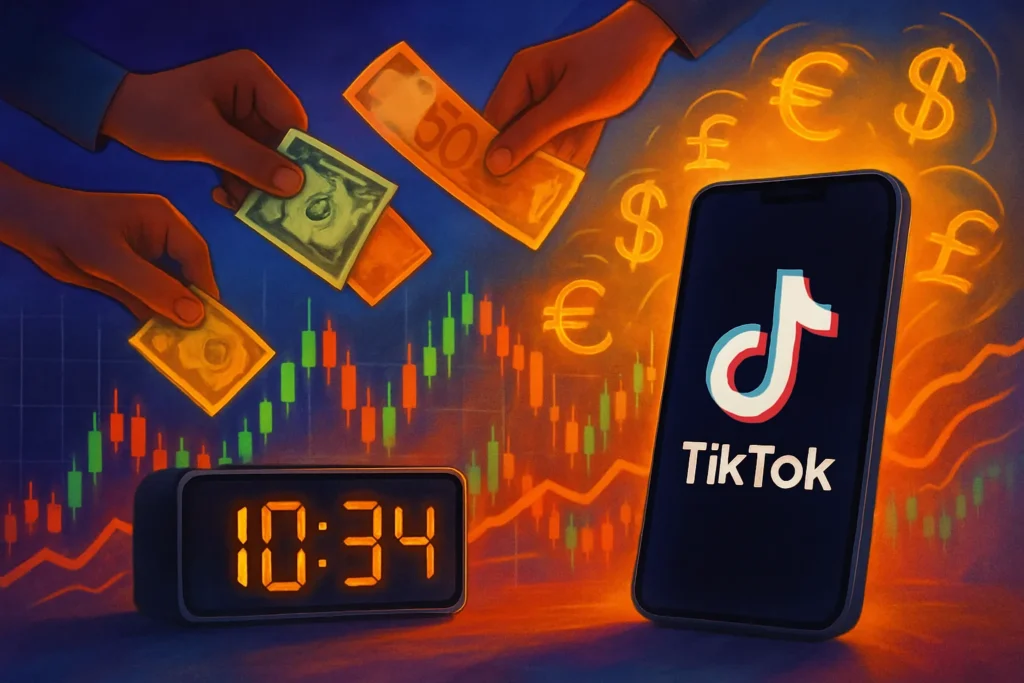President Trump Reveals Potential TikTok Buyers
President Donald Trump recently announced that a consortium of affluent individuals, including notable firms such as Oracle Corp., Blackstone Inc., and Andreessen Horowitz, is on the verge of acquiring TikTok’s operations in the United States. Trump indicated during an interview on Fox News Channel’s “Sunday Morning Futures with Maria Bartiromo” that he would formally reveal the identities of the involved investors within two weeks. This development comes amid an ongoing mandate that requires ByteDance, TikTok’s Chinese parent company, to divest its U.S. business to avoid a ban under U.S. national security regulations.
The negotiations around TikTok have been extensive, mired by complexities of international relations, particularly amidst a backdrop of intense U.S.-China trade tensions. A previous deal in April, which seemed nearly complete, collapsed due to additional tariffs imposed by Trump’s administration on China, resulting in prolonged uncertainty about TikTok’s U.S. future. According to details of that initial agreement, ByteDance would have seen its U.S. stake reduced to under 20%, with outside investors gaining significant control.
Oracle Corp. is expected to hold a minority stake and provide data security assurances as a key part of the current consortium offer. The existing arrangement would still require approval from authorities in both the United States and China, with Chinese President Xi Jinping’s consent specifically necessary to finalize the deal.
“We have found some very wealthy, very professional individuals who I think will do a tremendous job with TikTok,” Trump stated, without revealing further specifics.
Observers continue to monitor the situation closely, as the deal carries potentially broad implications for digital commerce, social media, and international technology cooperation.
Complex Negotiations and Repeated Extensions
Negotiations surrounding TikTok’s future in America have faced numerous hurdles, leading to several extensions by the U.S. administration. Originally, the U.S. government mandated the sale or ban of TikTok as a matter of national security, anticipating potential misuse of user data by its Chinese parent, ByteDance. Initially set to take effect right before Trump’s inauguration, the execution of this mandate was paused. Subsequently, multiple extensions have been granted, extending the current deadline to September 17, 2025, emphasizing the administration’s intent to secure an agreement that protects American users’ data while allowing TikTok continued operation in the U.S.
Legally, the situation remains complicated. TikTok and ByteDance have challenged the American government’s directive, with their case eventually reaching the U.S. Supreme Court. The Court upheld the ban as drafted, contributing to the pervasive uncertainty about the app’s future in the U.S.
The repeated extensions reflect the complexity of international negotiations and the economic value attributed to TikTok’s enormous user base. The app’s potential sale involves sophisticated arrangements, including partial ownership structures and specific regulatory compliance regarding data management practices.
“Securing a deal that satisfies both American national security interests and Chinese regulatory approval is significantly complex and politically sensitive,” noted a tech industry analyst closely monitoring these developments.
Furthermore, the involved consortium, particularly Oracle’s role, illustrates an innovative approach to safeguarding user data, potentially setting a precedent for similar future transactions involving tech companies with international ownership concerns.
Implications and Broader Context of the TikTok Acquisition
TikTok’s potential acquisition by this group of investors has far-reaching implications, affecting both international politics and global technological landscapes. Historically, technological interactions between China and the United States have frequently become grounds for geopolitical struggles. Notably, the Trump administration previously targeted Chinese technology firms like Huawei, underscoring apprehensions regarding national security and espionage.
The acquisition of TikTok would represent a significant Western reclamation of digital territory from a major Chinese tech entity. Additionally, the deal may provide a blueprint for future agreements involving international tech companies under scrutiny for similar geopolitical reasons.
Digital policy experts identify this prospective transaction as a major test case in balancing technological globalization and national security interests. If successful, the deal would also serve as a model for navigating complex international regulatory environments where technology and privacy concerns intersect sharply.
“This acquisition could mark a turning point in the balance between globalization and national security policy, setting regulatory standards for future international tech transactions,” explained a digital policy expert.
While awaiting the official announcement, industry watchers speculate on the potential transformations within the American digital market landscape post-acquisition. With TikTok’s proven popularity among American youth and businesses alike, the finalization of this sale may significantly influence competition within digital social platforms and the broader tech industry.
Ultimately, the resolution of TikTok’s ownership in America hinges not just on business negotiations but geopolitical relations, illustrating the intricate, multifaceted nature of contemporary global commerce and technology policies. As President Trump’s administration moves closer to revealing the consortium’s identity, stakeholders globally await further clarity, keenly aware of the broader ramifications this deal may herald.


